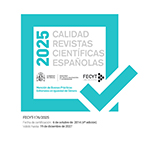El aula universitaria. La influencia del clima motivacional y el estilo de enseñanza sobre la autorregulación y el desempeño de los estudiantes
Resumen
Comprender la influencia que tienen las acciones del maestro en el aula en los procesos educativos de los estudiantes permite proyectar acciones de formación y cualificación docente para mejorar la enseñanza. Este trabajo estudia la influencia del entorno instruccional en la universidad, definido por el Estilo de Enseñanza y el Clima Motivacional de Clase, sobre la percepción de los cambios motivacionales, la autorregulación de emociones y el rendimiento académico, y cómo esta influencia es moderada por la orientación motivacional incial de los estudiantes. Participaron 214 estudiantes. Se analizaron tres modelos predictivos. Los resultados indican: primero, la orientación motivacional modera la percepción del entorno instruccional: la orientación a la evitación se asocia a una percepción negativa; segundo, el Clima Motivacional de Clase y el Estilo de Enseñanza favorecen la motivación orientada al aprendizaje, el estilo de autorregulación de las emociones orientado al aprendizaje, y la satisfacción con el docente; tercero, el Clima Motivacional de Clase parece mitigar el estilo de autorregulación orientado a la evitación. Finalmente, el Estilo de Enseñanza es la única variable que predice de forma positiva y significativa el rendimiento académico.
Descargas
Descarga artículo
Licencia
La Revista Complutense de Educación, para fomentar el intercambio global del conocimiento, facilita el acceso sin restricciones a sus contenidos desde el momento de su publicación en la presente edición electrónica, y por eso es una revista de acceso abierto. Los originales publicados en esta revista son propiedad de la Universidad Complutense de Madrid y es obligatorio citar su procedencia en cualquier reproducción total o parcial. Todos los contenidos se distribuyen bajo una licencia de uso y distribución Creative Commons Reconocimiento 4.0 (CC BY 4.0). Esta circunstancia ha de hacerse constar expresamente de esta forma cuando sea necesario. Puede consultar la versión informativa y el texto legal de la licencia.












